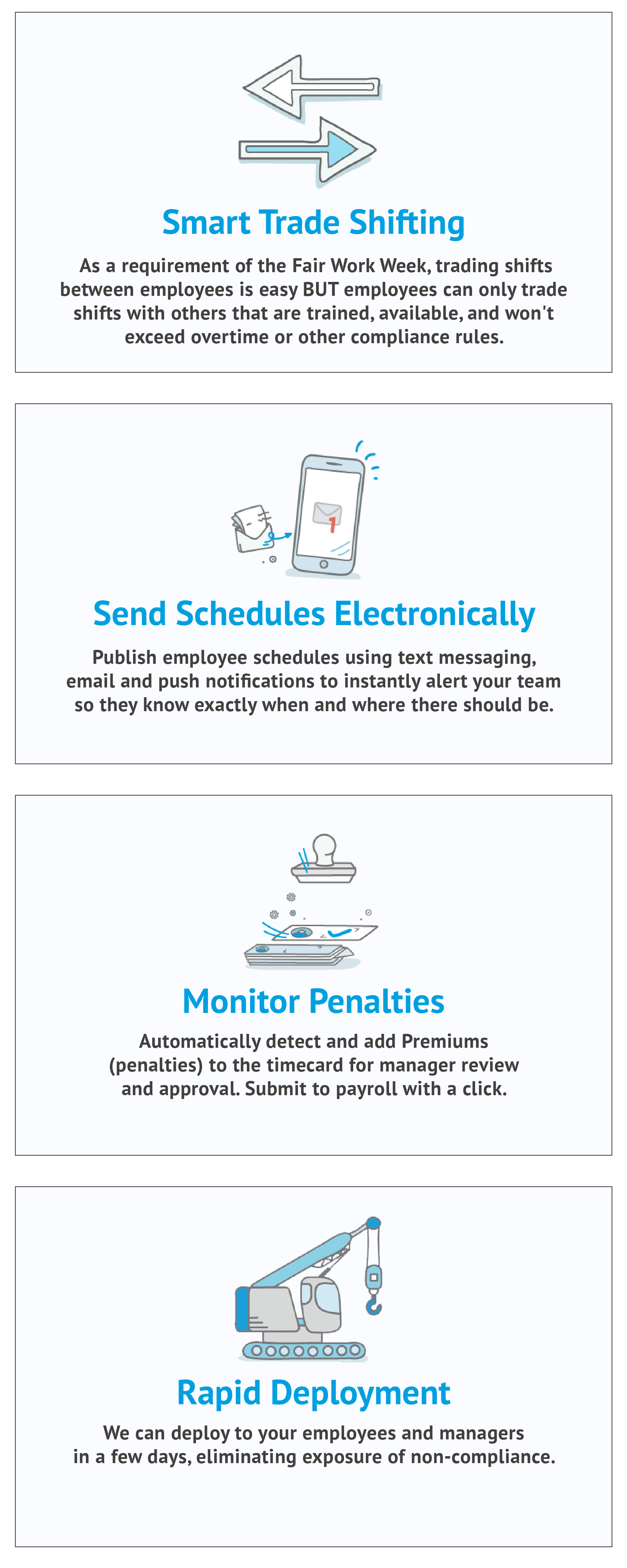Brief History
The first New York State minimum wage was $1.00 per hour. Since it was established in October 1960, New York’s state minimum wage has increased in spurts, with the first rapid increase occurring over a period of several years in the mid-to-late 1970s.
New York enacted its predictive scheduling laws on November 26, 2017. This legislation placed a range of responsibilities on some retail and fast-food companies in terms of scheduling their employees’ shifts. To read more about New York’s ‘Fair Work Week’ legislative package, check out this article.
Today
How much is the minimum wage in New York in 2018? Today, New York’s minimum wage rate depends on the geographic location of the workplace, the size of the employer’s workforce, and the calendar. New York enacted a minimum wage schedule in 2016 that will increase wages from $9 an hour to $15 over six years:
General Minimum Wage Rate Schedule
* Annual increases for the rest of the state will continue until the rate reaches $15 minimum wage (and $10 tipped wage). Starting 2021, the annual increases will be published by the Commissioner of Labor on or before October 1. They will be based on percentage increases determined by the Director of the Division of Budget, based on economic indices, including the Consumer Price Index.
Source: Department of Labor
New York State Minimum Wage for Fast Food Workers
Any person working at a Fast Food Establishment must be paid the Minimum Wage for Fast Food Workers. An employee’s job duties must include at least one of the following: customer service, cooking, food or drink preparation, delivery, security, stocking supplies or equipment, cleaning, or routine maintenance.
For fast-food workers in New York City, the minimum wage will increase from $13.50 to $15.00 an hour by the end of 2018. Fast-food employees in the rest of the state will get a $1 raise, from $11.75 to $12.75 an hour. These rates will increase annually until they reach $15.00 at the end of 2018 for New York City and in the middle of 2021 for the rest of the state.
The minimum wage increases only apply to restaurants that are part of a chain of 30 or more locations nationwide. The minimum wage covers fast-food workers at more than 130 chains operating in New York, including Arby’s, Burger King, Chick-fil-A, Dairy Queen, Domino’s Pizza, KFC, McDonald’s, Panera Bread, Pizza Hut, Starbucks, Subway, Taco Bell and Wendy’s.
The minimum wage rule also applies to local chains that operate at least 30 locations in New York.
Looking Ahead
The main priority for New York’s governor, Andrew Cuomo, is to increase the minimum wage to $15.00 an hour for all workers across New York State. While many New York state workers are not currently scheduled to reach that $15.00 per hour goal, those in New York City, Long Island and Westchester will enjoy a $15.00 per hour minimum wage by the end of 2021.
The wage hike will be over a period of three years for workers at large New York City companies and four years for workers at smaller city businesses.
On Long Island and in Westchester County, the minimum wage will reach $15 an hour over a six-year period.
For the remainder of the state, including all of upstate, it will take longer for the minimum wage to reach $15 an hour. The minimum wage for the rest of the state will rise to $11.10 at the end of 2018, $11.80 at the end of 2019, and $12.50 on Dec. 31, 2020.
In 2021, the minimum wage increase will be determined by the state budget director, who will use the consumer price index and other economic indicators to determine how much it should rise.
Enforcement of Minimum Wage Laws
We’ve seen a significant increase in the number of labor laws passed in states, counties, and cities across the country. To date, the U.S. has 29 states, six counties and 32 cities with minimum wage laws.
If an employer violates the Minimum Wage Law, they are subject to criminal prosecution and penalties. Action may also be taken in civil court. The Commissioner of Labor may require an employer to pay:
Minimum wage underpayments and liquidated damages
Interest and civil penalties up to 200 percent of the unpaid wages
Employers should ensure all non-exempt employees are earning the new minimum wage and exempt employees subject to a salary basis requirement are paid the minimum salary level. Additionally, employers should ensure all employees receive updated notices of their new rates in accordance with the New York State Wage Theft Prevention Act, which requires employers to provide notice of pay changes to employees.
How Deputy’s Workforce Management Technology can keep your business compliant
New York has already implemented the most stringent labor guidelines for fast food and retail with the Fair Work Week (FWW). On top of the administrative burden of the FWW, labor cost going up to double digits means employers must forecast their labor cost using more than just guesswork.
The most efficient way to stay compliant is to partner with a workforce management software platform that is up-to-date and can help business’ stay compliant with new predictive scheduling laws. Deputy recently announced the addition of compliance tools to help businesses stay ahead of U.S.-based regulations. Another important feature that Deputy offers is the capability to auto-approve shifts based on specific criteria like overtime and predictive scheduling triggers. To learn more, book a demo with one of our team members below:
These tools help employers manage compliance to avoid penalties and potential class-action lawsuits; all while saving your business money and time.
With Deputy, you can:

Fair Workweek is an issue that’s not going away. But, Deputy makes it easier to solve. Subscribe to the Deputy blog and download our Fair Workweek guide to stay informed on this legislation.
